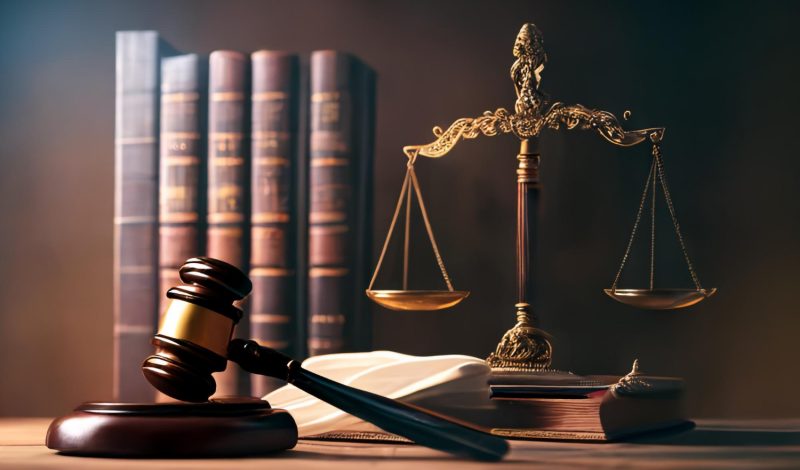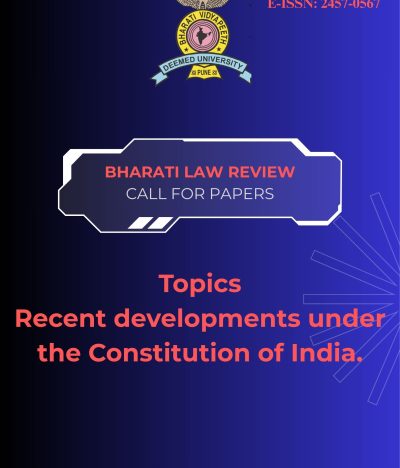Dr. Jaykumar Bhongale*
Mr. Oishik Bhattacharya**
ABSTRACT:
This research paper is about the moral ramifications of racism and some of the numerous expenses exhausted by institutionalised racism. The Researchers contended that, whether intentionally or unintentionally, the laws, social structures, and institutions of ancient culture are responsible to maintain the historical legacies of racial injustices. The researchers have undergone a thorough doctrinal and analytical investigation and find out the fact that there have been several instances of particular circumstances due to specific elements that have occurred and have led to significant inequality and prejudice among the pilgrimages.
The present article has discussed several issues like priority treatment to VIPs in temples, maladministration, misuse of public donations, and violations of fundamental and human rights of the pilgrims. This article also discussed present judicial opinion and analyses of recent judicial precedents related to the present topic. The Researchers have found out that the government has a very silent approach relating to the situation of pilgrims and the development of temple administration.
Last but not least the researchers here have provided some suggestions and recommendations regarding the issues which were discussed. The researchers think that if the solutions provided in the paper below are implemented then the problem might be partially or completely eradicated. Moreover, the solutions provided below are some of the stances of the general people too.
Keywords: Financial racism, Religious ramifications, Pilgrims, Maladministration, judicial solutions.
1. INTRODUCTION:
Indians with higher educations could see the flaws and decline in Indian society, and they began to work methodically for its dissolution. They were no longer prepared to accept Hindu society’s customs, values, and practices just because they had been followed for so long. Shri Rammohan Roy campaigned tenaciously against social ills like sati, polygamy, child marriage, female infanticide, and caste prejudice in his capacity as a social reformer. The Brahmo Samaj was revitalised by Shri Debendranath Tagore, the son of Shri Rabindranath Tagore. In addition to establishing schools and coordinating famine relief, Shri Keshab Chandra Sen promoted widow remarriage.
The current VIP culture in politics and administration has encouraged feudalism and perpetuated a form of social stratification that is harmful to the collective psyche of the populace. India is a stunning nation, not just because of its diversity but also because of its fascinating cultures, mysteries, and history. The actual presence of Gods, which you can experience in pilgrims’ sites, world-famous temples, and historic locations. All a devotee wants is to get sight of the Lord and keep him in their hearts forever, to feel and touch him, and to pray to him for a moment, but what does he/she get after spending hours and hours waiting in line? After such a long wait, the
management and Lord’s Garbgrah say to proceed without upsetting the line while they are just a few meters away! In numerous temples, including Mahakal Darshan, Tirupati Balaji, Vaishno Devi, etc., it frequently occurs. On the other side, someone who has paid more money may travel from a less populated place, approach the Lord who is seated nearby, and offer lengthy prayers. The biggest query is: How can this be justified in a nation where everyone has the same rights? The practice has now sparked a heated discussion about whether VIP and special tickets ought to be outlawed.
2. JUDICIAL & GOVERNMENTAL APPROACH TOWARDS THE CULTURE OF VIP DARSHANS:
A series of directives for the proper maintenance of the Subramaniya Swamy Temple in Tiruchendur, Thoothukudi district, were issued by the Madurai Bench of the Madras High Court. Special entry for VIPs should not result in an infringement of the right of equality to devotees and the general public waiting for darshan.[1]
People are unhappy with VIP culture, particularly in private locations like temples where the devotees are forced to suffer because VIPs and other prominent people are given special darshan, according to Justice S.M. Subramaniam. According to him, it is the responsibility of the temple administration to make sure that VIP darshan is offered without interfering with general public access.
The judge ruled that there cannot be any prejudice because VIPs visit temples for darshan just like regular worshippers. “God is the only VIP”. Any VIP who gives the public devotees any inconvenience is breaking the law, and God will not pardon them, the cleric stated.[2]
There is no disputing the fact that some individuals merit special darshan. However, the person’s special offices, not the person themselves, are the only ones who receive such treatment. The temple administration is required to keep track of the VIPs that the Central and State Governments have informed them about, and they are the only VIPs who may follow the protocol set down by the temple administration.
It is made clear that anybody else, including devotees or benefactors, will not be permitted to have special darshan by setting up a separate queuing system or beside VIPs in the temple if they do not fit under the category of VIP. Only 10 minutes should be allotted for special darshan, and the gathering in front of the deity should also be managed in order to avoid upsetting the devotees.[3]
In Siva Thanu Chettiar and Ors. v. The State of Tamil Nadu & Ors.[4] The Madras High Court held that the decision to collect the fee for special Dharsan will not amount to the imposing of tax and therefore, Article 265 will not be attracted. Collection of fees for special darshan does not discriminate against any person in worshiping the deity and is not a violation of the principle laid down under Article 14 of the Constitution of India.
The Supreme Court in 2007 granted permission to the authorities of Kerala’s famed Sabarimala Temple to continue with the practice of according to Special Queue Darshan for VIPs and devotees performing special pujas at the Shrine. This decision overruled the ban imposed by Kerala High Court on such privileges to the high and mighty. The Apex Court after staying the ban directed the Travancore Devaswom Board (TDB) to come out with proper guidelines and an effective solution to regulate the queue so as to avoid inconvenience to the
general devotees.[5]
The Andhra Pradesh High Court[6] on July 18, 2019, dismissed the appeal against VIP Darshan at Tirupati Tirumala saying that categorising Darshan under Line 1, Line 2, and Line 3 for a specific time period will not violate the rights of devotees. However, The High Court directed the Tirupati Tirumala Devansathams (TTD) to take necessary steps to ensure that common devotees also get smooth Darshan.
A Public Interest Writ Petition was filed by Advocate J. Prabhakaran in the Madras High Court[7] to stop the practice of allowing VIPs and VVIPs to have special Darshan in the temples during the time of festivals, he exclaimed that there will be no discrimination against the public devotees. He further suggested all the police officials and concerned authorities shall take adequate measures for the safety and equal treatment of all the devotees.
· An evaluation of the plans for the visit to the four Himalayan shrines led to the directives to discontinue VIP darshan. One of the most venerated holy locations in the Hindu religion is the Char Dham, a grouping of the four pilgrimage sites Yamunotri, Gangotri, Kedarnath, and Badrinath.
3. HOW THE PRACTICES OF VIP DARSHAN VIOLATE INDIVIDUALS RIGHTS?
The Supreme Court’s and High Courts’ stance on various occasions ranging from VIP Darshan in Sabarimala Temple to Tirupati Balaji Temple has been in favor of preferential treatment towards the rich. The Madras High Court ruled on November 2017 in Indic Collective Trust v. The Commissioner[8] that, notwithstanding shorter lines in temples for those who purchase tickets for darshan, the distance from the deities that the general public is allowed to pray to should be the same for all devotees, regardless of whether they purchased tickets for darshan or not.
The First Bench, which was made up of Chief Justice Indira Banerjee and Justice M. Sunder, issued the directive in response to a PIL filed by the Indic Collective Trust which asked that the Hindu Religious and Charitable Trust be instructed to regulate the system of providing better benefits to those who have purchased “Paid Darshan” tickets at the Srivilliputhur Sri Andal temple, Arulmigu Ekambaranathar temple in Kancheepuram, and Arulmigu Oppilappan in Thirunagesaram.[9]
The Court ruled that everyone must receive the same amount of distance for their darshan of the deity, regardless of whether they have paid or not.
The trust claimed that a student had recently visited these temples and had assumed that all devotees, including those who had paid for Darshan, would be given access to the deity for the same amount of time and from the same distance.
A complaint against VIP darshan at the Kashi Vishwanath Temple under the Sugam Darshan Scheme was dismissed by the Allahabad High Court.
This decision was made after a PIL submitted by Gajendra Singh Yadav was heard by the division bench of Justice Manoj Misra and Justice Sameer Jain. The petitioner, who identified himself as a follower of Lord Shiva and a frequent visitor to the Sri Kashi Vishwanath Temple, claimed that the Board of Trustees’ decision to implement the Sugam Darshan system violates the fundamental rights guaranteed by Articles 14, 15, and 26 of the Indian
Constitution. According to the petitioner, Section 14 of the 1983 Act (Shri Kashi Vishwanath Ordinance) imposes specific obligations on the Sri Kashi Vishwanath Temple Trust, which was established in accordance with the requirements of the UP Sri Kashi Vishwanath Temple Act, 1983. The provision of facilities for the pilgrims’ and worshippers’ correct performance of worship is one of these obligations.
According to the petitioner, the Board of Trustees effectively prevented the average person from exercising his or her right to worship and engaging in the necessary religious observances associated therewith by offering a special facility of Sugam Darshan in exchange for the payment of specific fees.
The Supreme Court’s ruling in Sri Adi Visheshwara of Kashi Vishwanath Temple, Varanasi and others v. State of U.P. and others[10] has been cited by the petitioner’s attorney.
The petitioner’s attorney argued that the right to enter the temple, touch the Linga of Lord Sri Kashi Vishwanath Temple, and personally perform pooja is a crucial religious practice that must be protected. By establishing a special facility for Sugam Darshan, the performance of the above- mentioned established religious practice would be hindered, and the facility thus violates the fundamental rights of an Indian citizen and a follower of Linga. Invoking Section 15 of the 1983 Act, (Shri Kashi Vishwanath Ordinance) which states that the Board shall exercise all powers incidental to or necessary for the performance of its duties, Manish Goyal, who represents the State, and Vineet Sankalp, who represents the Board of Trustees, have drawn the court’s attention to this provision.[11]
The Sugam Darshan facility[12] has been made available not to exclude common worshippers or stop them from engaging in fundamental religious duties, but rather to enable a certain class of people who, due to physical limitations or for other reasons, are unable to stand in line to receive Darshan. This facility has been set aside so that they can exercise their right to worship, without excluding the other category of Lord Shiva worshippers.
Goyal continued by saying that such a facility may be found at any temple where a big number of worshippers congregate, including the temples of Lord Balaji and Maa Vaishnav Devi.
3. CONCLUSION & RECOMMENDATIONS:
- There should be a day or timing set for lines for every type of person in order to prevent crowds for the prominent personalities.
- VIPs should be evaluated based on the circumstances, not on their wealth or reputation.
- It is the responsibility of the temple administration to make sure that VIP darshan is offered without interfering with general public access. There is no disputing the fact that some individuals merit special darshan.
- The temple administration is required to keep track of the VIPs that the Central and State Governments have informed them about,
- Only 10 minutes should be allotted for special darshan, and the gathering in front of the deity should also be managed in order to avoid upsetting the devotees.
The following steps must be taken to ensure the sanctity of temples:
- Equity in Temples in terms of queues and darshan
- Preference for Pregnant women, Senior citizens, specially-abled, etc.: Temples must make sure that senior citizens, pregnant women, Divyang-Jan, etc. are allowed to reach the main
temple without having to crawl in queues. They shouldn’t be charged a fee for the same. Rather, on a simple showing of an ID card or relevant proof, the above-mentioned category of people should be taken care of.
- Better Utilization of Resources: During most of the non-festive times, it’s only a few VIPs visit the renowned temples. When there will be no VIPs seeking darshan, the facilities arranged for VIPs like the reserved lane not being utilized, the temple authorities must make sure that those lanes shall be utilized to minimise the waiting period of general devotees by allowing them to use the vacant lanes.
- Provide Preferential Treatment only to deserving pilgrims: Preferential treatment shall be given to the personnel who serve the nation or whose time is precious and to those individuals who may face security threats. Rich Businessmen and those with a recommendation letter from political figures shouldn’t be allowed a cut-through route to the main temple.
4. LEGAL RECOMMENDATION
The Government of India needs to put down strict rules against this act of chauvinism which is allowing just the wealthier strata of society.
- There should be certain laws put down that will regulate the flow of extra cash from the privileged devotees to the temple authorities
- The State Governments should set up certain committees or boards which will keep a check on the financial flow of the temples which will certainly reduce the donations paid.
- The Finance Minister should need to recognize a new law that will mark the amount paid to the temple authorities as taxable.
- There should be a formation of a certain board that will keep a regularised check on the procedure followed by the temple authorities.
- The Budget statement submitted by the chief executive of the temples, should be moved forward to the authorised officer of the state government who will be especially appointed to keep a check on it.
- The Chief Executive should be held liable if there is any mishap in regard to temple funds.
- Under section 44 of The Uttar Pradesh Sri Kashi Vishwanath Temple Act,[13] 1983 discusses the problem which might be faced by temples by their decision. It says that if any problem I faced within the two years of coming into force of that act, it should be repealed.
The researchers suggest that there should be an authorized official of the State Government who will conduct or check the problem, and how and why it is affecting the temple. Then only after the passing of an order by the authorized official, the Act can be repealed.
- Section 36 of the Act,[14] says that all the employees and officials of the temple will be treated as public servants during their time of employment. The researcher suggests that temples being private property how the employees can be referred to as public servants. This section should be repealed.
Even if they are denoted as public servants then all the viable related sections to public servants should be administered by the State Governments. If they are being referred to as public servants then they should be elected by the State Governments keeping in mind the reservation Policy and they should represent the state and not the temple.
References
* Assistant Professor and Research coordinator of Bharati Vidyapeeth Deemed to be University, New Law College, Pune
** Student of BBA LLB SEM VII, Bharati Vidyapeeth, Deemed to be University, New Law College
Pune.
[1] Staff Reporter, “HC stays Single Bench order on maintenance of Tiruchendur temple” The Hindu (Madurai, 31 March 2022), section Madurai.
[2] Staff Reporter, “Special entry for VIPs should not infringe on right of equality to devotees: HC” The Hindu (Madurai, 23 March 2022), section Tamil Nadu.
[3]Ibid.
[4](2005) 2 MLJ 113.
[5] Legal Correspondent, “Opening of traditional routes to Sabarimala | Supreme Court allows petitioner to approach High Court” The Hindu (New Delhi, 29 August 2022), section Kerala.
[6] MANU/AP/0327/2019.
[7] “Plea wants HC to stop VIP Darshan in temples,” The Times of India, 24 December 2011.
[8] Indic Collective Trust v. The Commissioner, MANU/TN/0683/2021.
[9]Ibid.
[10] MANU/UP/2676/2021.
[11] “Mismanaging India’s temples – violation of ‘freedom to practice one’s own religion’?” Free Speech Debateavailable at: https://freespeechdebate.com/discuss/mismanaging-indias-temples- violation-of-freedom-to-practice-ones-own-religion/ (last visited September 18, 2022).
[12] “Kashi Vishwanath VIP darshan: Allahabad High Court dismisses petition against scheme,” India Legal, 2021available at: https://www.indialegallive.com/top-news-of-the- day/news/kashi-vishwanath-vip-sugam-darshan-scheme/ (last visited September 18, 2022).
[13] Section 44 of the Uttar Pradesh Sri Kashi Vishwanath Temple Act.
[14] Ibid.





